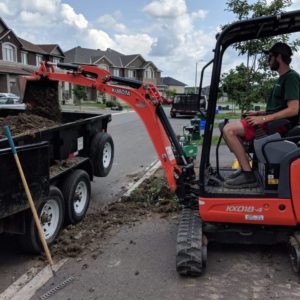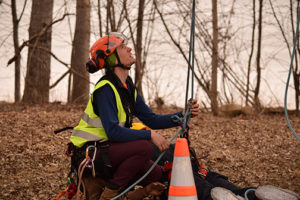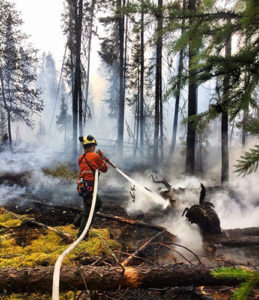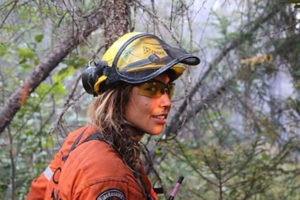The Sky’s the Limit for Forestry Students
Posted on Tuesday, January 8th, 2019
There can be a bit of a misconception when it comes to career paths for students who study forestry. Students enrolled in the Forestry Technician and Urban Forestry – Arboriculture programs at Algonquin College’s Pembroke Campus, soon realize that the sky’s the limit when it comes to possible career opportunities after they graduate from the program.

Take for example Griffin Kozij’s story. Before registering in the program, Kozij had operated a successful landscaping business. Now, as a recent Urban Forestry – Arboriculture graduate, Kozij is taking the skills that he learned during the 8-month program and expanding his business.
He admittedly came into the program with a love for working in the outdoors but didn’t know much about being an arborist. He now says, “It’s all about trees. You can go into the program knowing absolutely nothing and graduate as an experienced climber.”
Kozij also has some advice for others who are unsure if they will be making the right decision if they are considering a career in forestry. “Don’t let your uncertainty hold you back. If you appreciate nature and trees it is definitely a good fit. You learn about climbing, but also about how trees and a forest in our urban environment can have such a big impact and be so important,” says Kozij.
Becoming an urban forester has allowed Kozij to expand his business and customer base. He can now offer more services and he has needed to add more team members to meet client expectations. He is much more knowledgeable and appreciative of how enrolling in a forestry program can open up doors to unexpected opportunities. “There are so many avenues that you can go into – you are not just going to be a climber – there are a hundred different paths from office work, to consultation, to forest management. You can even continue your studies.”
 Leveraging previous post-secondary education and continuing his studies is exactly what Julian Alvarez-Barkham decided to do. Also an Urban Forestry – Arboriculture graduate, Alvarez-Barkham thought he would enter the forestry workforce immediately after graduating, but had a change of heart when he discovered the Masters of Forest Conservation program offered at the University of Toronto.
Leveraging previous post-secondary education and continuing his studies is exactly what Julian Alvarez-Barkham decided to do. Also an Urban Forestry – Arboriculture graduate, Alvarez-Barkham thought he would enter the forestry workforce immediately after graduating, but had a change of heart when he discovered the Masters of Forest Conservation program offered at the University of Toronto.
Although he is not getting to climb as many trees as he did during his time at Algonquin College, Alvarez-Barkham appreciates how that practical experience helped prepare him for his university studies. “The Urban Forestry – Arboriculture program helped me develop a solid foundation in dendrology, tree assessment, soils, and urban forestry that I can build upon as I further my education. The Algonquin College faculty’s passion and enthusiasm for tree care was an incredibly important aspect of my education. Their dedication has motivated me to learn more and to keep improving. Their value to the program cannot be overstated.”

Photo Credit: Ontario Ministry of Natural Resources and Forestry
When it comes to passion for the forest and education, few programs can challenge the 50-year history of Algonquin College’s Forestry Technician program and Nikki Domingo is proof of that. Domingo graduated from the program a few years ago and says, “I wouldn’t be where I am today had it not been for the amazing schooling and networking support I received from Algonquin staff.”
This past summer, Domingo was fighting forest fires in the Pickle Lake, Ontario area. Her passion for forest firefighting was sparked during her placement in the final semester of the Forestry Technician program in 2015. She is now into her second year as a Fire Ranger Crew Boss. “My role is to apply adequate fire suppression in a safe manner while supervising the crew members.

Photo Credit: Ontario Ministry of Natural Resources and Forestry
Some of the fires can be very intense. As a crew boss, Domingo’s role includes being a “cutter.” “When the helicopter can’t land I get out in a hover exit with a swamper and fell trees to cut a helipad. Once the helipad is cut we set up a pump and start laying hose to the fire. When we reach the fires’ edge, I jump on the nozzle and we begin to suppress and wrap the fire until it’s out.”
When all three graduates were asked if they thought they would be where they are now when they started their forestry studies, all answered no. But isn’t that the point of higher education? It opens up opportunities to transform hopes and dreams into lifelong success.
If a career in the outdoors is what you are looking for, now is the perfect time to apply to our forestry programs and start on your new path this September with us.
- Posted in
- Waterfront Campus Blog